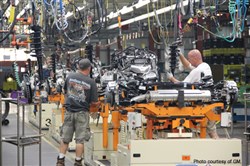VOL. 37 | NO. 39 | Friday, September 27, 2013
GM draws workers from wide area
By Bill Lewis

Cars are assembled at the General Motors Spring Hill Manufacturing Plant in Spring Hill. General Motors announced in early August that it is spending another $167 million at the factory so it can build two new midsize vehicles.
-- General MotorsAs General Motors creates 1,800 additional jobs at its factory in Spring Hill, the economic impact will be felt far beyond Maury and Williamson counties, where the city is located.
In fact, the economic benefit could be shared by more than a half-dozen more counties across Middle Tennessee if those new workers follow in the footsteps of people already working at the factory.
Many of those workers live in Maury and Williamson counties, but others commute from Davidson, Wilson, Rutherford, Lewis, Lawrence, Marshall and Bedford counties.
“We have employees all over. We have some who commute as far as the Alabama state line,” GM spokesman Kristy Bergstrom says.
Individuals and families transferring to the area for jobs in Spring Hill are expected to add additional strength to a booming housing market in Williamson and Maury counties.
“It will create good relocation business from other (GM) plants. It’s good for the economy,” says Andy Pfeifer, president of Lennar Corp.’s Middle Tennessee operations. Lennar, one of the nation’s largest home builders, recently entered the southern Middle Tennessee market.
The company plans to build up to 450 homes in the Tollgate Village community in Thompson’s Station, a growing town next to Spring Hill. It also is negotiating for several hundred home building sites in the Bridgemore Village subdivision.
In the past, when GM added jobs in Spring Hill it created opportunities for its employees to transfer from other states. Some of them were workers who had previously been furloughed from jobs in Spring Hill and were returning home.
It’s too early to tell who the new workers at the factory will be, since production of the two new midsize vehicles they are being hired to manufacture is still three years away, says Bergstrom.
GM’s growth should have far-reaching effects, says Peder Jensen, director of sales for the Jones Co. The home building company is active in the Canterbury, Belshire and Wade’s Grove subdivisions.
“The impact is not strictly GM but the ancillary effects. It supports more businesses and makes it a more desirable location,” Jensen adds.
Adding 1,800 additional jobs at the GM factory will have a ripple effect through the economy, says Wil Evans, president of the Maury County Chamber and Economic Alliance. Each job at GM supports up to seven additional jobs at companies that supply auto parts and at other businesses.
“The indirect jobs could have a huge impact,” he says.
Those new jobs will give added vitality to a local economy that has been growing by leaps and bounds over the years even as employment at GM’s factory has taken a roller coaster ride of peaks and valleys. At its highest level, the plant employed more than 7,000 people who manufactured vehicles for GM’s Saturn division.
Nearby, the Berry Farms planned community on the south side of Franklin will eventually include several hundred single-family houses, townhomes, apartments and several million square feet of retail and office space.
About a mile away, Ryan Homes plans to build more than 800 homes in the Stream Valley subdivision.
John Maher, who has built 1,800 homes in the area in 23 years, says Spring Hill is attractive to many different kinds of home buyers, including retirees and families who want their kids to attend Williamson County’s highly regarded schools.
There’s another reason Spring Hill’s economy has outgrown its dependence on GM. Many of its residents commute to jobs in Nashville, just 40 miles away on I-65.
They also are there for the large yards and good housing values.